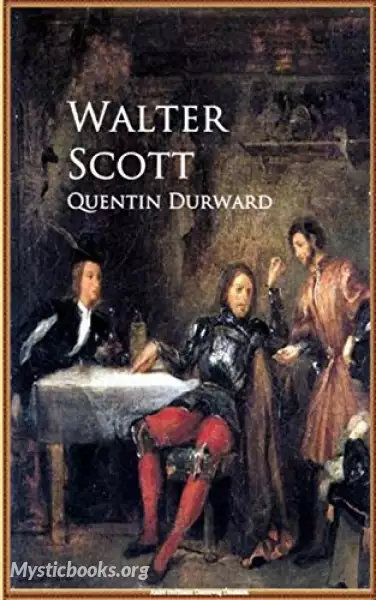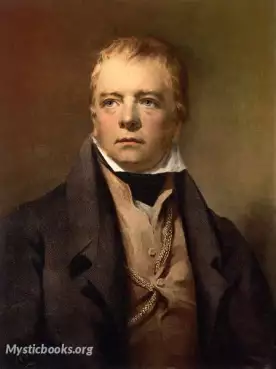
Quentin Durward
'Quentin Durward' Summary
The story takes place in the year 1468. The age of feudalism and chivalry was passing away, and the King of France was inciting the wealthy citizens of Flanders against his own rebellious vassal the Duke of Burgundy. Quentin Durward had come to Tours, where his uncle was one of the Scottish body guard maintained by Louis XI, to seek military service, and was invited by the king, disguised as a merchant, to breakfast at the inn, and supplied by him with money. Having narrowly escaped being hanged by the provost-marshal for cutting down Zamet, whom he found suspended from a tree, he was enlisted by Lord Crawford, and learned the history of Jacqueline. In the presence-chamber he was recognised by Louis, and the royal party were preparing for a hunting excursion, when the Count of Crèvecœur arrived with a peremptory demand for the instant surrender of the duke's ward, the Countess of Croye, who had fled from Burgundy with her aunt to escape a forced marriage; and proclaimed that his master renounced his allegiance to the crown of France. In the chase which followed Durward saved the king's life from a boar, for which service Louis, after consulting with his barber, entrusted him with the duty of conducting the Countess and Lady Hameline, ostensibly to the protection of the Bishop of Liege, but really that they might fall into the hands of William de la Marck. After proceeding some distance they were overtaken by Dunois and the Duke of Orléans, who would have seized the countess, but were prevented by Lord Crawford, who arrived in pursuit and made prisoners of them. Then Hayraddin came riding after them, and under his guidance they journeyed for nearly a week, when Quentin discovered that the Bohemian was in league with De la Marck. He accordingly altered their route, and they reached the bishop's castle in safety.
A few days afterwards, however, it was assaulted by the citizens, and Hayraddin having effected Lady Hameline's escape with Marthon, Quentin rushed back to save the countess, and, at Gieslaer's suggestion, Pavilion passed them as his daughter and her sweetheart into the great hall where the outlaw, who was known as the Boar of Ardennes, was feasting with the rioters. The bishop, who was also governor of the city, was then dragged in, and, having denounced his captor, was murdered by a stroke of Nikkel Blok's cleaver. There was a shout for vengeance, but De la Marck summoned his soldiers, upon which Quentin held a dirk at the throat of his son Carl, and exhorted the citizens to return to their homes. With the syndic's help Lady Isabella and her protector reached Charleroi, where she was placed in a convent, while he carried the news to the Duke of Burgundy, at whose court Louis, with a small retinue, was a guest. Charles, in a furious rage, accused the king of being privy to the sacrilege, and caused him to be treated as a prisoner.
At a council the following day he was charged with abetting rebellion among the vassals of Burgundy, and the countess was brought as a witness against him. She admitted her fault, and Quentin Durward was being questioned respecting his escort of her, when a herald arrived with a demand from De la Marck to be acknowledged as Prince-Bishop of Liège, and for the release of his ally the King of France. Louis replied that he intended to gibbet the murderer, and the messenger, who was discovered to be Hayraddin, was sentenced to death, the quarrel between the duke and the king being at the same time adjusted, on the understanding that the Duke of Orléans should marry Lady Isabelle. Crèvecœur, however, interceded for her, and it was arranged that whoever should bring the head of the Boar of Ardennes might claim her hand. Quentin, who had learnt his plans from the Bohemian, advanced with the allied troops of France and Burgundy against his stronghold, and a desperate battle ensued. At length the young Scot was in the act of closing with De la Marck, when Pavilion's daughter implored his protection from a French soldier; and, while placing her in safety, his uncle La Balafré fought the ruffian, and carried his head to the royal presence. Lord Crawford declared him to be of gentle birth, but the old soldier having resigned his pretensions to his nephew, King Louis vouched for Quentin's services and prudence, and the duke being satisfied as to his descent, remarked that it only remained to inquire what were the fair lady's sentiments towards the young emigrant in search of honourable adventure, who, by his sense, firmness and gallantry, thus became the fortunate possessor of wealth, rank and beauty.
Book Details
Authors

Sir Walter Scott
Scotland
Sir Walter Scott, 1st Baronet was a Scottish historical novelist, poet, playwright, and historian. Many of his works remain classics of both English-language literature and Scottish literature. F...
Books by Sir Walter ScottDownload eBooks
Listen/Download Audiobook
- Select Speed
Related books

The Life Everlasting: A Reality of Romance by Marie Corelli
In this thought-provoking novel, Marie Corelli explores the nature of reality and the possibility of an afterlife. "The Life Everlasting: A Reality o...

The Deadly Dust by Murray Leinster
The book follows the story of a group of scientists who discover a deadly new substance that threatens to wipe out all life on Earth. Set in a post-a...

Warme Polarland by Ernst Constantin
Ähnlich Jules Verne in seinem Roman "Reise zum Mittelpunkt der Erde", so führt uns auch Ernst Constantin in die Urtümliche Welt der Dinosaurier zurück...

The Moon Men by Edgar Rice Burroughs
This is an exhilarating science fiction novel that takes readers on a thrilling journey to a lunar world filled with danger and intrigue. Written by t...

Adventures of Gil Blas de Santillane by Alain René Lesage
Gil Blas de Santillane is a classic picaresque novel that follows the titular character's journey through various social strata in 18th-century Spain....

The Old Tobacco Shop by William Bowen
The Old Tobacco Shop: A True Account of What Befell a Little Boy in Search of Adventure is a children's fantasy novel by William Bowen that was named...

Atomic! by Henry Kuttner
Step into a world where time is both a tool and a weapon, where the fabric of reality hangs in the balance. In "Atomic!" by Henry Kuttner, the boundar...

Lady Barbarina by Henry James
In Henry James's *Lady Barbarina*, the reader is presented with a tale that explores the complexities of love and marriage in the context of transatla...

Monica - Complete by Evelyn Everett-Green
It tells the story of Monica, a young woman who is orphaned and must make her own way in the world. Monica faces many challenges and setbacks as she s...

The Crucifixion of Philip Strong by Charles M. Sheldon
What would you do if you woke up one day and found yourself crucified? Philip Strong is a wealthy and successful businessman who has it all: money, p...
Reviews for Quentin Durward
No reviews posted or approved, yet...